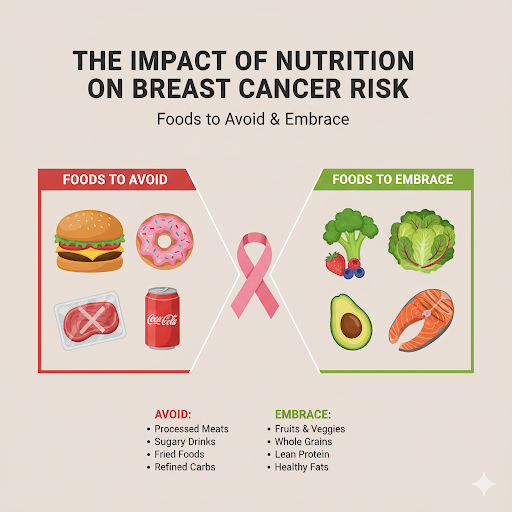The Impact of Nutrition on Breast Cancer Risk: Foods to Avoid and Embrace
October 09, 2025 | Thursday | Features
Breast cancer is a growing concern for women across the world
While many causes of breast cancer are linked to factors we cannot change, like age, family history, or genetics, some lifestyle choices may reduce or increase risk. Among these, diet plays an important role. What we eat every day can influence our overall health, body weight, and in some cases, even cancer risk.
Let’s discuss how diet fits in alongside other steps like regular screening and timely breast cancer treatment.
Understanding the Importance of Diet
Research shows that certain foods contain nutrients that may protect the body against cancer by reducing inflammation, strengthening the immune system, and preventing DNA damage. On the other hand, some eating habits, like consuming too much processed food or sugar, may contribute to obesity or hormone changes that increase the chance of developing cancer.
It is important to remember that diet alone cannot prevent or cure cancer. However, it can be a strong support for healthy living and lower the risk of many diseases.
Foods That May Help Reduce Breast Cancer Risk
Leafy Green Vegetables
Vegetables like spinach, kale, and mustard greens are full of vitamins, fibre, and antioxidants. These nutrients help protect cells from damage.
Cruciferous Vegetables
Vegetables such as broccoli, cauliflower, and cabbage are called cruciferous vegetables. They contain compounds that may slow the growth of cancer cells and help the body remove harmful substances.
Citrus Fruits
Fruits like oranges, lemons, and grapefruits are rich in vitamin C and antioxidants. These may protect the body from cell damage and support the immune system.
Berries
Blueberries, strawberries, and raspberries are packed with plant chemicals that fight inflammation. Research has linked berry consumption to a reduced risk of certain types of breast cancer.
Beans and Legumes
Beans are rich in fibre and protein. Eating beans regularly may support healthy weight management and lower cancer risk.
Whole Grains
Whole wheat, oats, brown rice, and quinoa are high in fibre and important nutrients. Replacing refined grains with whole grains may help lower the risk of breast cancer.
Fatty Fish
Fish like salmon, mackerel, and sardines contain omega-3 fatty acids. These healthy fats may reduce inflammation and support heart and body health.
Nuts and Walnuts
Walnuts, almonds, and peanuts provide healthy fats, fibre, and vitamins. Some studies suggest nuts may lower the chances of breast cancer developing or spreading.
Fermented Foods
Foods like yoghurt, kimchi, and miso contain probiotics that support gut health and may strengthen immunity. A healthy gut can play a role in protecting against cancer.
Herbs and Spices
Spices such as turmeric, ginger, and parsley contain natural compounds with anti-inflammatory and antioxidant effects. Adding them to daily meals may help support better health.
Foods and Habits to Avoid or Limit
Alcohol
Drinking alcohol is a strong risk factor for breast cancer. Even small amounts may increase risk, and heavy drinking is especially harmful. Reducing or avoiding alcohol is an effective lifestyle steps to lower breast cancer risk.
Processed Meats
Foods like sausages, bacon, and ham contain preservatives and chemicals that may raise cancer risk. Limiting processed meats is important for overall health.
Fried Foods
Eating fried foods regularly adds unhealthy fats and calories to the diet. Research shows that a high intake of fried foods may increase breast cancer risk.
Fast Food and Junk Food
Fast foods are often high in fat, sugar, and salt. They contribute to obesity, which is one of the known causes of breast cancer, especially after menopause.
Added Sugars
Sugary drinks, sweets, and desserts raise calorie intake and can lead to weight gain. Excess weight may increase hormone levels in the body, which can trigger cancer growth.
Refined Carbohydrates
White bread, white rice, and baked goods made with refined flour can raise blood sugar levels quickly. A diet rich in refined carbs is linked to higher cancer risk.
Lifestyle Choices Beyond Food
Nutrition is only one part of the picture. Other lifestyle habits also matter in reducing breast cancer risk. Staying physically active, maintaining a healthy weight, avoiding smoking, and getting enough rest all support overall health.
Regular screenings like mammograms and self-checks are equally important. These help detect breast cancer at an early stage when breast cancer treatment is most effective.
The Role of Nutrition in Treatment and Recovery
For people already diagnosed with breast cancer, eating a balanced diet can support recovery. Nutritious foods help the body handle treatments such as chemotherapy, radiation, or surgery. They also reduce side effects like fatigue and weakness.
Doctors often recommend that patients eat small, frequent meals that include vegetables, fruits, lean proteins, and whole grains during breast cancer treatment. Drinking enough water and avoiding alcohol or processed foods are also key.
Final Thoughts
While we cannot control all the causes of breast cancer, we can make healthy choices to support our bodies. A diet rich in fruits, vegetables, whole grains, beans, fatty fish, and nuts may lower risk, while reducing alcohol, fried foods, and processed meats can help too.
Making these changes step by step, along with exercise, regular medical check-ups, and guidance from Onco Life Hospitals, can protect long-term health.
Onco-Life Cancer Centre understands the importance of nutrition and lifestyle in cancer care. By combining medical expertise with guidance on healthy living, patients and families can take stronger steps toward prevention, recovery, and overall well-being.









